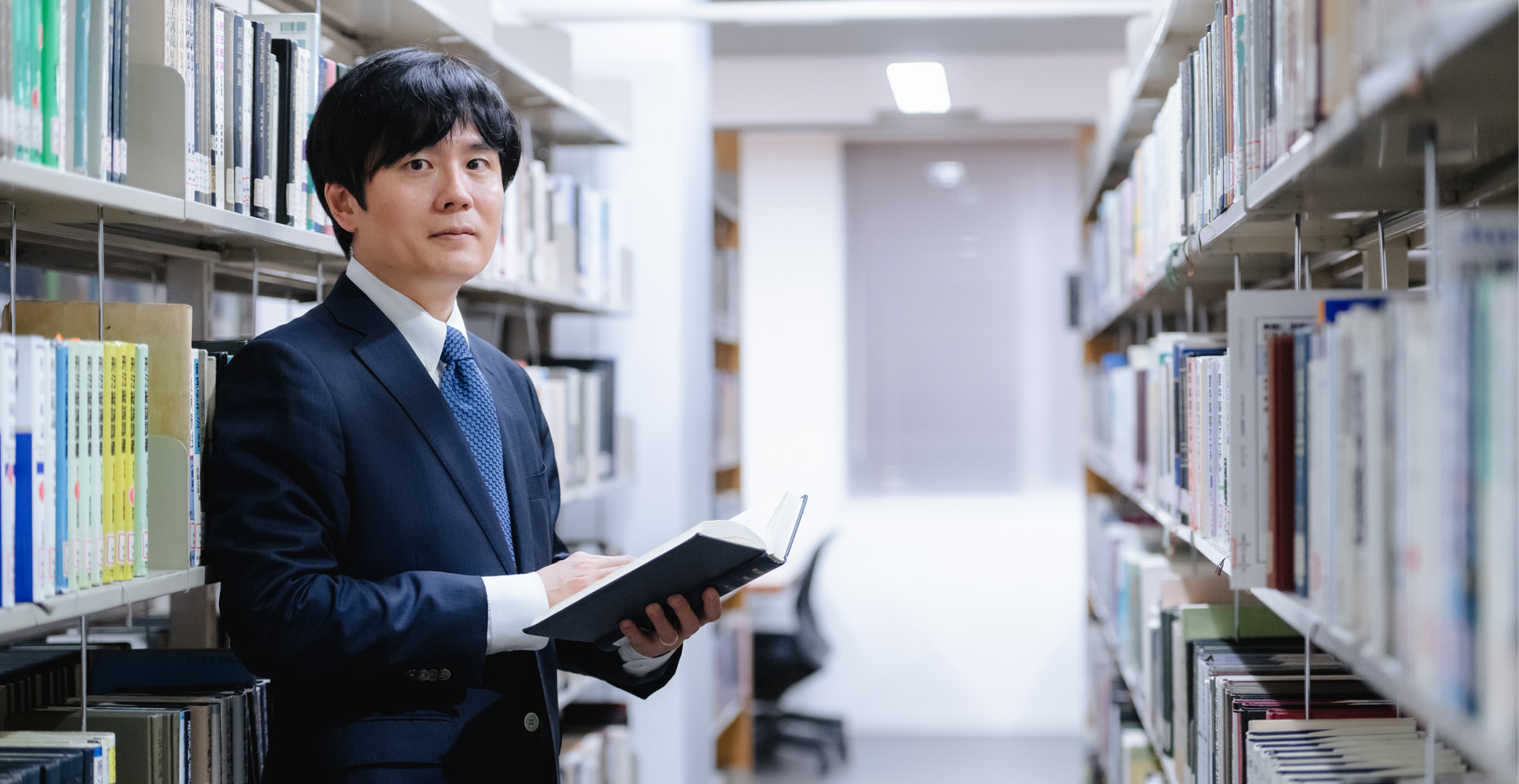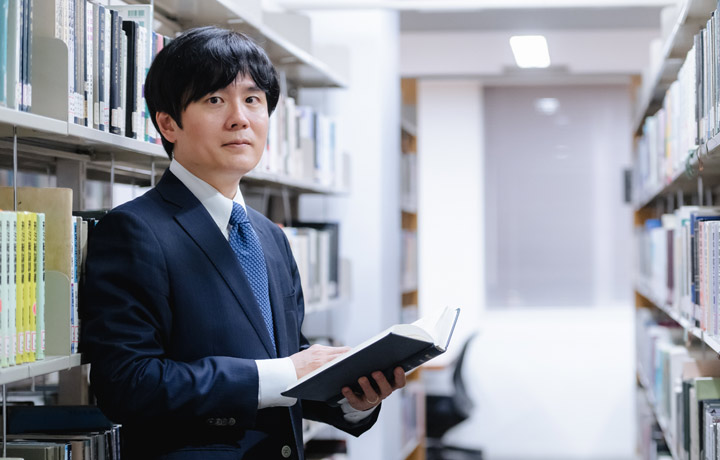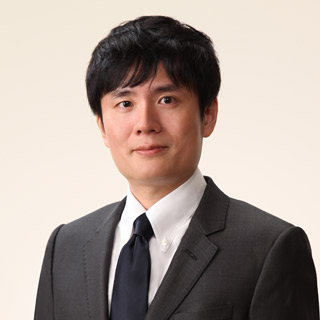In today’s society, where new information and communication technologies (ICT) continue to evolve and transform the nature of crime, criminal law is often left struggling to catch up. Professor Yoshiaki Nishigai of the Graduate School of Social Sciences at Chiba University is exploring new approaches to criminal law by integrating insights from diverse disciplines and contributing these ideas to society.
From Engineering to Law: The Impact of the ‘Winny copyright infringement case’
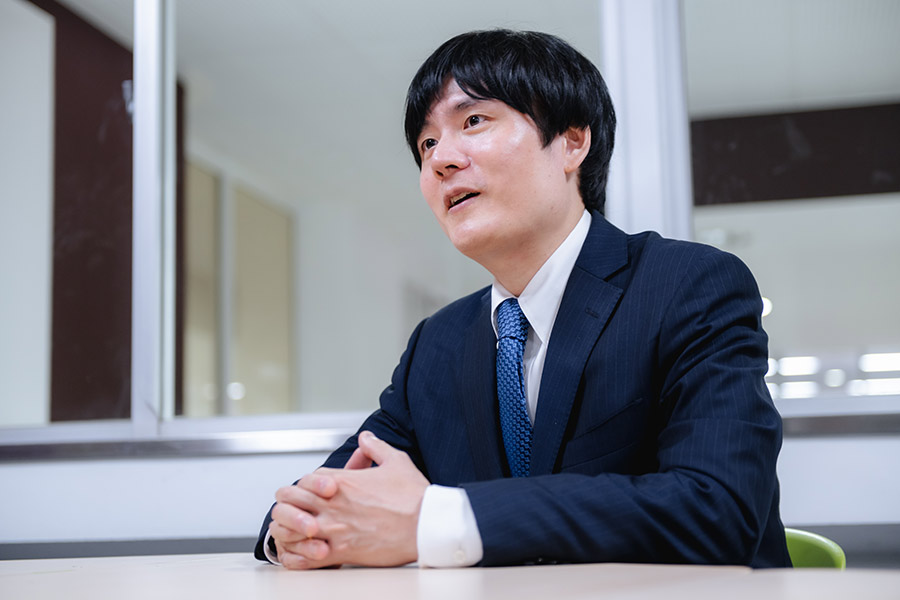
—You pursued engineering through your master’s degree before making an ashpit to law and eventually becoming a legal scholar. That’s a rather unique career path.
It was during the second year of my master’s program at the Graduate School of Information Science and Technology when the incident, later known as the ‘Winny copyright infringement case,’ occurred. I vividly recall watching the news as police searched and seized computers at the university where I was enrolled at that time—it left a lasting impression.
Winny copyright infringement case: In May 2004, the developer of the peer-to-peer file-sharing software “Winny” was arrested and charged with aiding (Beihilfe in German) copyright infringement. The case triggered widespread debates over the balance between technological innovation and copyright protection. Eventually, in 2011, the Supreme Court of Japan acquitted the developer.
— Were you personally involved in the incident?
No, I wasn’t personally involved. However, Winny’s developer was a faculty member in our department (the Graduate School of Information Science and Technology). He was arrested for allegedly furthering users’ commitment to copyright violations through his software. Winny was a groundbreaking application that allowed file sharing without relying on a central server. Unfortunately, a considerable number of its users shared large volumes of copyrighted contents, including video games, which led to serious copyright infringement issues.
In this case, not only were the users who exchanged files prosecuted illegally, but the developer of the software was also charged—simply for creating and making it accessible to the public. I found that deeply troubling. “Can someone truly be held criminally liable just for developing and distributing software?” That question compelled me to explore the world of law.

— With your engineering background, you could have specialized in intellectual property law, such as copyrights and patents.
At first, I thought that would be the natural path for me as well. But as I studied law, I came to realize that the key issue in the Winny case wasn’t copyright law—it was criminal law. The developer hadn’t engaged in illegal file sharing, yet he was arrested and prosecuted as an accessory. That concept falls under the domain of criminal law (specifically, article 62) and is not directly linked to copyright law.
“Accessoryship, Aiding” refers to actions that facilitate or promote criminal activity. However, the definition is quite broad, which is precisely why the developer could be charged. A common analogy is a knife shop: if someone buys a knife and later uses it to commit a murder, we don’t hold the shop responsible, unless there are special circumstances. By that logic, simply creating and providing a tool that might be misused shouldn’t automatically be seen as ‘promoting a crime.’ But what counts as ‘aiding?’ How do we assess whether the developer or provider intended to promote illegal activity? These were the questions I wanted to explore more deeply. That curiosity led me to write a paper on the topic during my third year of law school.
Cyberspace: Beyond the Framework of the Physical World
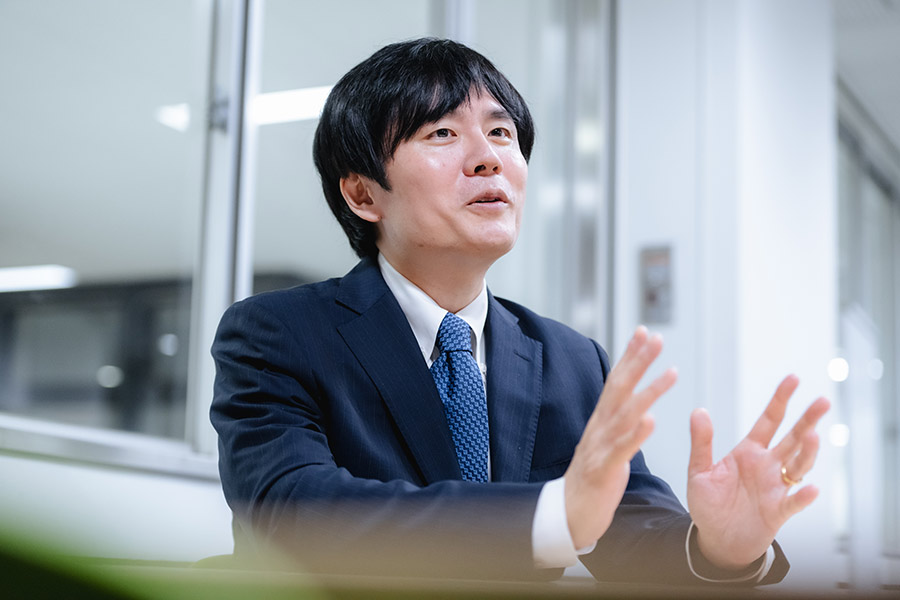
— In the Winny case, the district court found the developer guilty of aiding copyright infringement.
At first glance, this outcome might seem unsurprising—after all, if someone provides a tool that can be used to commit a crime, it’s easy to see that as ‘facilitating’ it. In fact, that kind of interpretation had long been applied. While crimes involving computer programs were not anticipated when the Criminal Code was written, sudden reconstruction of the traditional concept of aiding would have been far from simple. However, the Osaka High Court took a different approach and acquitted the defendant. The Supreme Court also upheld the acquittal, although the reasoning, concluding that the developer lacked the intent to assist in the crime—in this case, copyright infringement, was different from that of the high court.
Traditional criminal law concepts were primarily built around tangible objects and physical acts. As a result, when it comes to computer crimes committed in cyberspace, those legal concepts don’t always apply directly or adequately.
My specialty lies in exploring how criminal law should respond to these challenges. I refer to this emerging field as information criminal law—a discipline that focuses on legal responses to the unique nature of intangible concept ‘information.’
The Challenge of Addressing ‘Information’ in Existing Criminal Law

— New ICT is emerging every day, transforming not just specific industries but the very structure of society. It must be difficult for the law to keep up with these rapid changes.
Indeed. A lot of research focuses on how laws can adapt to ever-changing technologies and society. However, I prefer to search for the underlying, unchanging, and universal logic behind these changes. Unless we identify and work from these enduring principles, legal responses will always lag. My goal is to uncover what doesn’t change so we can better understand and engage with what does.
— Can you provide a specific example?
In legal discussions, ‘information’ and ‘data’ are often used interchangeably. But I believe they must be distinguished. For example, if someone downloads a data file containing trade secrets but doesn’t open or read it, it can be said that they’ve acquired the data—but not the information. Conversely, if someone hears those secrets over the phone, they’ve acquired the information but not the data. The two are clearly not the same, and treating them as such leads to confusion.
Consider a law that criminalizes not only the distribution of sexually explicit deepfake images but also their viewing. Would merely downloading the image file count as ‘viewing’? Or would punishment apply only if the content is actually seen? Without a clear distinction between ‘data’ and ‘information,’ it’s difficult to determine what kind of behavior the law is meant to regulate. This creates serious problems for both legislation and legal interpretation.

That’s why I suggest we distinguish among the information itself, the way it’s expressed, and the medium it’s recorded on (three layers model). While this kind of thinking may not yet be common in legal society, it’s especially important when dealing with issues like secrets and cybersecurity.
Deepfake: Synthetic media (mainly videos or audio) created using deep learning technology, often used to realistically mimic someone’s face or voice.
— New ICT developments continue to emerge. Isn’t it difficult for criminal law to keep up with all of them?
It’s certainly a challenge. But if we allow broad interpretations—like those seen in the Winny case—to go unchecked, developers of new technologies may hesitate to innovate, fearing that their work might be deemed illegal. Information criminal law seeks to strike a balance: preventing malicious acts while ensuring that innovation isn’t stifled.
It’s easy to point out that new technology could be misused or to argue for regulation based solely on its potential for misuse and accidents. But rather than starting from existing legal logic, I believe we should begin by asking: what kind of society do we want to build? Then, we can consider what kind of legal systems and interpretations are necessary to realize that vision.
Take AI, for example. Before jumping into discussions about how it should be regulated, we need to consider how society wants to use AI and what role it should play in the future. If AI matches—or even exceeds—human-level accuracy, is that acceptable? Or should we hold AI to a ‘nobler’ standard, expecting it to cause no harm at all, even accidentally? These are the kinds of questions we must pose when considering the function of criminal law. Meanwhile, it is imperative to acknowledge that overly strict regulations could hinder progress in technology and the growth of related industries.
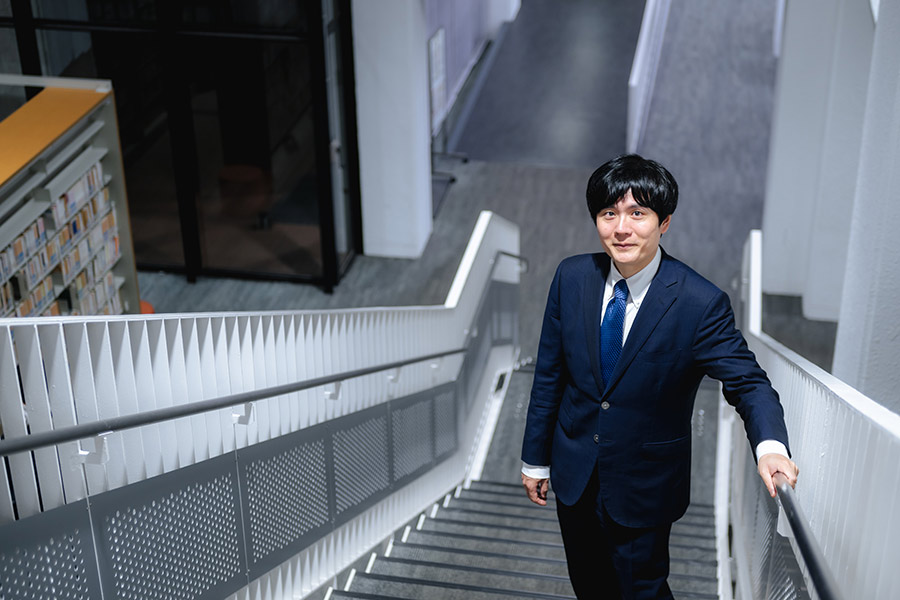
Recommend
-

Touchable Buddha Project: Bridging Heritage and 3D Technology for Community Revitalization through Design
2024.03.29
-

The role of the Research Institute of Disaster Medicine (RIDM): The indispensable research hub for urban digital transformation
2023.02.23
-

Live on the Moon, Settle on Mars: Research Center for Space Agriculture and Horticulture for Space Food Production and Supply
2023.10.20






